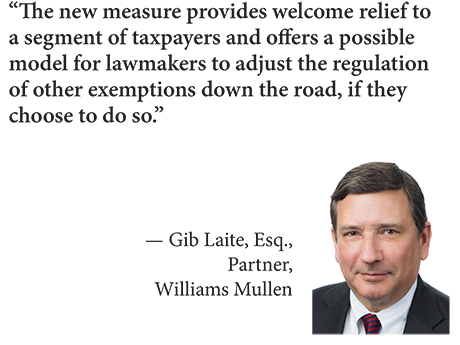By Gib Laite, Esq. of Williams Mullen
North Carolina has little sympathy for taxpayers that miss filing deadlines, but a new law eases the potential repercussions for property owners otherwise qualifying for religion-based tax exemptions. Under the new measure, taxpayers can apply for the religious exemption from property taxes going back five years from the law’s adoption date earlier this year.
It will be interesting to see whether the General Assembly extends a similar grace period to other exemptions over time. Regardless, the new measure provides welcome relief to a segment of taxpayers and offers a possible model for lawmakers to adjust the regulation of other exemptions down the road, if they choose to do so.
And for all taxpayers, the recent change provides a good opportunity to review how North Carolina grants and regulates property tax exemptions.
Machinery of Taxation
As a rule, North Carolina subjects all real and personal property to property tax unless the General Assembly or the state constitution exempts the property, or it falls into a special class of exempted property. Most exemptions are set out in the Machinery Act, a framework of tax rules within the North Carolina General Statutes.
The Machinery Act allows for several types of exemptions from property taxation. Exemption is automatic for property that is government owned, burial property, non-business personal property, intangible property, and certain inventories. There is no filing requirement or action required by the taxpayer to receive these exemptions.
Relief is available for other uses including charitable, historic, religious and educational properties, as well as for the present-use value of property used for certain agricultural purposes, but these common exemptions require action on the taxpayer’s part. To obtain exemption for these uses, the taxpayer must file the appropriate formal application during the listing period, which generally is the month of January.
The act allows late filings for “cause,” a term not clearly defined, but approved late filings only apply to the calendar year during which the application is made. That means that if a late filing is allowed for cause in a given year, the taxpayer must file again – and before the deadline – in a later year to maintain the exemption going forward.
Once a taxpayer has correctly filed and received an exemption for a charitable, historic, religious or educational property, subsequent annual filings are unnecessary to maintain the specified property’s exempt status while the property, ownership and use remain unchanged. The law does require a new filing in the event of a change in the property, such as land being added or deleted, or if there is a change in use or ownership.
Lapses and Religion
Woe to the taxpayer who fails to file a new application for a previously exempt property when there is a change affecting the exemption, such as a usage alteration or ownership restructuring. The taxpayer is then at risk of a “discovery” that the exemption no longer applies and, if the lapse persists, the levy of back taxes for five years with exponential penalties.
Historically there was no relief for the taxpayer who failed to make the required filing or missed the deadline. There was no escape from this liability, until now. In 2025, the legislature added a relief valve, limited to religious exemption.
Session Law 2025-20 (HB91) changed North Carolina law to allow a taxpayer claiming a religious exemption to file a late application that would apply to the previous five years. Any relief accorded is limited to a release of liability for the taxes levied, however; there is no provision for refund of any taxes already paid.
This provision appears targeted to situations where a property would qualify for the religious exemption if the taxpayer had correctly followed the application process. Examples could include an owner establishing a qualified religious use of a property who failed to apply for an initial exemption or missed the filing deadline. Alternatively, a new owner may have continued an existing exempt use but failed to file a new application on time after taking over the property.
Other scenarios could include an owner of an exempted property who expanded the parcel by acquiring an adjacent tract, then failed to reapply on the reconfigured real estate. Similarly, discovery may have revealed that a filing error excluded a portion of a property from its original exemption application.
A taxpayer granted a retroactive exemption should not expect a refund of taxes already paid. The “release” described in the measure would free the taxpayer from having to pay any back taxes they would have otherwise owed for the past five years without the exemption, however.
This new law took effect June 26, 2025, without amending the existing statutes. Because it is uncodified, a taxpayer or researcher would not learn of it simply by reading the statutes making up the Machinery Act. Hopefully, any researchers will be using a new version of the statutes with explanatory notes describing the bill, or will be familiar with the new law through other research.
— Gib Laite is a partner in the law firm Williams Mullen, the North Carolina member of American Property Tax Counsel (APTC), the national affiliation of property tax attorneys. Reach him at glaite@williamsmullen.com.


